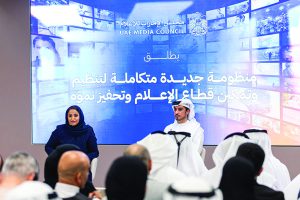DUBAI / WAM
The UAE Media Council launched a comprehensive system to regulate, empower, and stimulate growth in the media sector. This initiative builds upon the transformative journey initiated with the Council’s establishment in February 2023 and the subsequent issuance of the Media Regulation Law and its Executive Regulation. The announcement was made during a press conference, held on Thursday at Creators HQ in Emirates Towers, Dubai, in the presence of Mohammed Saeed Al Shehhi, Secretary-General of the UAE Media Council, and Maitha Al Suwaidi, CEO of Strategy and Media Policies Sector at the UAE Media Council. Mohammed Saeed Al Shehhi emphasised the Council’s ongoing commitment to launching a new media system that embodies the UAE leadership’s vision for a modern and integrated media landscape. This system aims to drive a transformative shift in the development of the UAE’s media sector, ensuring its continued regional and global leadership, as envisioned by the UAE’s leadership.
Al Shehhi stated, “The new system transforms the way the media sector is regulated and developed, as it combines updated legislation, comprehensive media services, and policies covering various sectors to enhance efficiency and sustainable growth.” Al Shehhi highlighted the Media Regulation Law and its Executive Regulation as a milestone for a new era of competitiveness and leadership for the UAE media sector. As the first media law issued in over 40 years, it establishes a solid foundation for a future-proof media landscape, addressing advancements in digital media, artificial intelligence, gaming, on-demand broadcasting, and other evolving fields.
He added, “This system was developed over two years, through close collaboration with federal and local entities, media organisations, content creators, and international experts, reflecting a belief in partnership-based legislation grounded in practical application. This approach ensures responsiveness to change, empowers talent, fosters innovation, and attracts investment.” Furthermore, Al Shehhi noted that the new media system goes beyond establishing frameworks, focusing on content as the core of the industry. “We ensured that it incorporates clear standards for responsible, balanced content that respects values and identity while promoting creativity and impact,” he said, emphasising the importance of creative individuals as the foundation of effective media. Al Shehhi concluded, “The goal is to empower the media sector to become a driving force for development and a vital economic engine contributing to the national GDP and enhancing the UAE’s regional and global competitiveness. The new system aims to unlock potential, stimulate investment, and empower content creators through a flexible environment, streamlined procedures, incentivising exemptions, and strategic partnerships at both local and international levels.”
Maitha Al Suwaidi stated that the UAE Media Council is spearheading a transformation of the national media landscape, achieved through a comprehensive legislative roadmap designed to modernise the sector’s regulatory framework and create a flexible, contemporary environment. She noted that this environment will both keep pace with global media trends and foster a more impactful and sustainable media industry.
Al Suwaidi explained that this roadmap goes beyond traditional legal frameworks, as it includes not only the Media Regulation Law and its Executive Regulation but also a series of policies and regulatory decisions reflecting a deep understanding of the challenges and opportunities presented by new media, with the aim of enhancing media practices to ensure they align with the UAE’s core values. A key element of this system is a new resolution regulating social media advertising by individuals. This measure aims to build public trust, protect audiences, and improve the quality of online media content. It also offers concrete support to content creators through a three-year exemption from permit fees, she stated. Furthermore, Al Suwaidi stated that the Council is implementing a comprehensive age rating system for media content to safeguard children and adolescents from inappropriate material, particularly crucial given the rise in digital content consumption. She also noted a new policy for licensing digital news platforms is also being developed, to establish clear professional and regulatory guidelines to enhance credibility, ensure adherence to journalistic standards, and promote responsible practices within a balanced legal framework.
Regarding regulations, Al Suwaidi highlighted the adoption of the Cabinet’s resolution on media service fees and the resolution on violations and administrative penalties, representing a significant step towards a unified, flexible, and transparent media services system. This user-friendly system aligns with the UAE government’s vision for proactive and integrated digital services, streamlining processes for media organisations and content creators within a growth-oriented regulatory environment.
She emphasised that the local content empowerment policy is central to this system, prioritising Emirati talent and creative projects within the national media strategy, with fee exemptions for several media services to support local producers, writers, and creatives, and encourage content that reflects national identity and elevates the quality of the media message.
In conclusion, Al Suwaidi stated that this new legislative system represents a pivotal moment in the development of a modern Emirati media landscape founded on transparency, professionalism, and quality. It provides media organisations and content creators with a robust regulatory structure that enhances their production capabilities and unlocks opportunities for growth and global competitiveness.
 The Gulf Time Newspaper One of the finest business newspapers in the UAE brought to you by our professional writers and editors.
The Gulf Time Newspaper One of the finest business newspapers in the UAE brought to you by our professional writers and editors.
